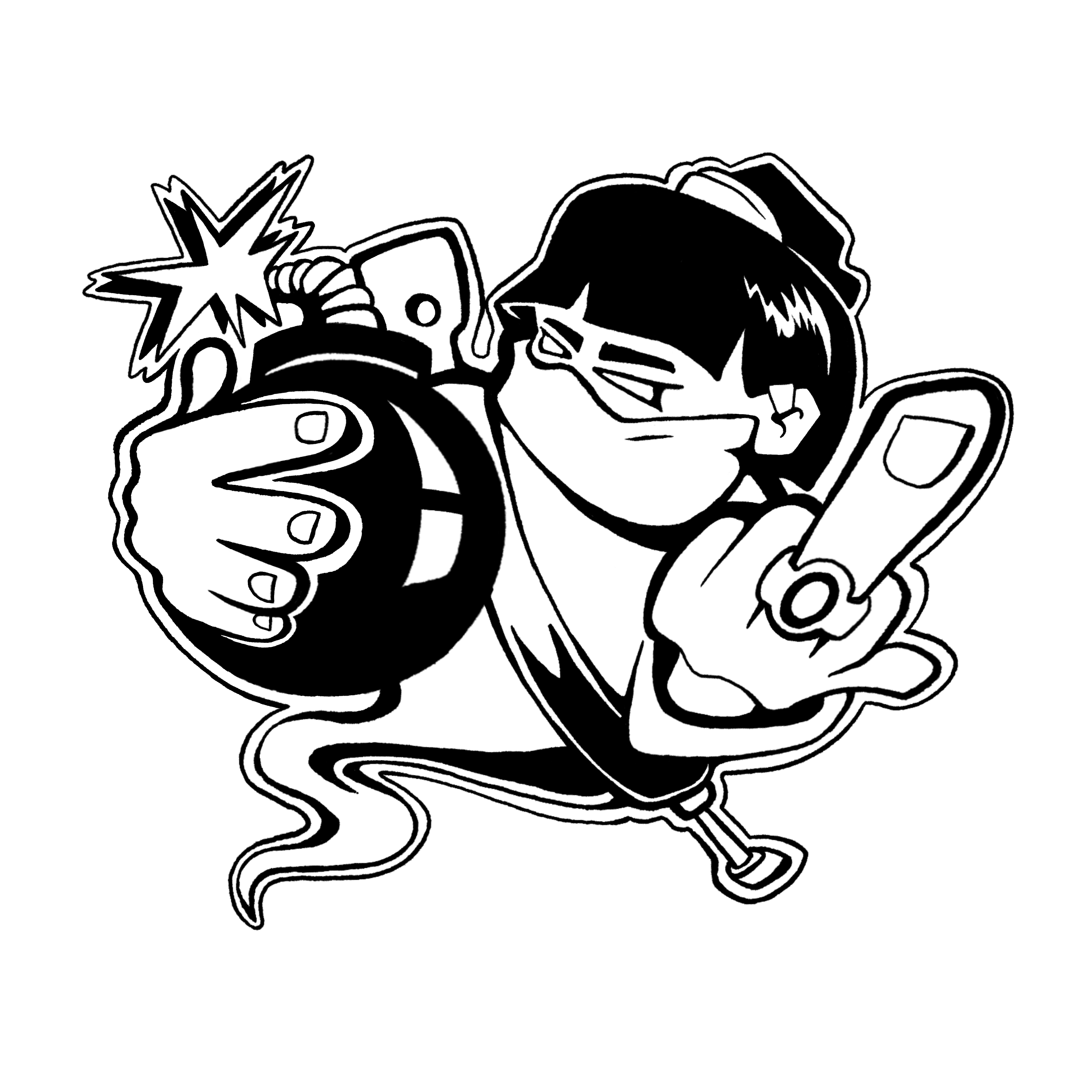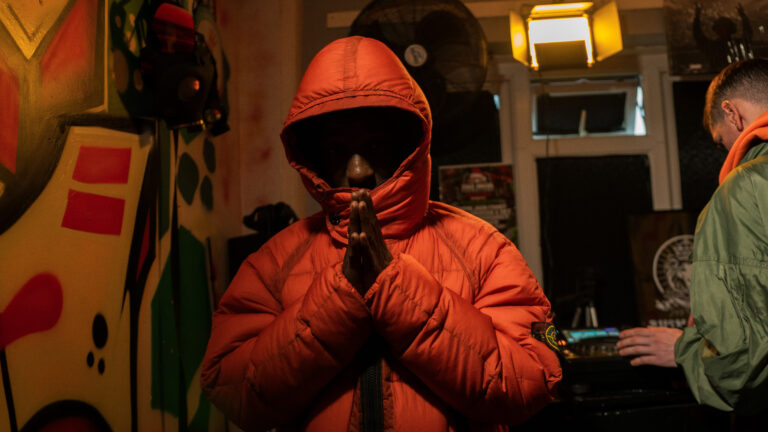With a series of groundbreaking releases from renowned underground producers such as 4am Kru, Guido YZ, Krunx, and Phasmid, Da Demolition Squad has quickly established itself as a dominant force in the UK grassroots scene, earning a valid reputation for pushing the boundaries of multi-genre bass music.
Established in 2020 as an offshoot of Singularity UK, Da Demolition Squad boldly test the confines of bass music through multi-genre grassroots revitalisation. What sets them apart is their innovative approach to music production, embracing a multi-genre “squad” mentality that transforms every artist into an integral part of the crew. By embracing spirited collaboration and a multi-genre approach, they’re pushing the boundaries of the old-school sound and challenging dance music conventions.
Last September, Da Demolition Squad excitingly announced their ‘Da Total Demolition Tour’, spanning ten cities across the UK. The tour featured some talented names in underground music, including Tim Reaper, Louise Plus One, Hughese, Worsley, and Glinks, who showcased the Squad’s unique blend of jungle, techno, UKG, and 160. Da Demolition Squad’s success on the tour wasn’t just due to their talented roster of artists – it was also a testament to their innovative and collaborative approach to music production and event promotion. In addition to their successful UK tour, Da Demolition Squad has been making exciting debuts across major cities in Europe, further solidifying their grassroots presence.
We had the chance to chat with Ariel, aka The Bass Injector, head-honcho of Da Demolition Squad, who shared exclusive insights into the Squads’ essence, the highlights from last year’s tour, and the label’s contribution to the international spread of underground UK bass music.
I bet you are very busy at the moment. Any cool updates or achievements you’re excited about lately?
Our recent show in Milan was really good fun! Myself and Guido YZ had the opportunity to go out there to represent Da Demolition Squad, which was probably the highlight of March.
Milan looked sick! How is it doing all these shows now that are attracting international crowds?
As we’re based in the UK, international crowds don’t often get to hear our music, unless they specifically come to hear it, which definitely creates a more genuine energy amongst the crowd. Even if they stumble upon it, they’re open to the experience because it’s so different from what they’re used to hearing. I especially enjoyed the show in Milan as we started at 130 bpm with garage house and gradually sped it up to 160 bpm by the end – and they were loving it! They were honestly such a cool crowd with genuine energy.
And how was the Radio Raheem show…
While we were out there we got to do the show for Radio Raheem. It was in a cultural centre in one of the central parks. When we stepped out from the radio show, there was this exhibition going on with lots of freaky photos. It was very cool. Fracture (Charlie Fieber) plugged it for Guido and me, which is very kind of him, so shout out to Fracture.
That sounds like a wicked experience. Let’s dive into the recent releases from Shirley Temper, Guido YZ & 4am Kru, and Krunx. What’s it like representing these diverse bass artists?
Our audience is diverse, and some people might wonder how these different styles correlate. But with Demolition Squad, the focus is on the old-skool sound, and if I enjoy the music, I’m happy to share it with the world. That’s why our music evolves based on my interests and what artists are sending me. I’m fortunate to know all the individuals you mentioned personally so it’s good to have a lot of mates that I can put out their music. It’s like a family, and I’m glad to support their music by putting it out there.
Tell us, how exactly did Demolition even come about?
I have been running Singularity with my friend Benji since 2019. Then lockdown happened so we had to start to think about doing things differently, away from organising parties. We were doing a Singularity online radio show but I also wanted to turn Singularity into a record label. There were three of us working on it regularly at the time, and it was just taking really long to properly turn it into a record label. When you have three people working and giving input, it takes more time. Even though that was on the way, I knew that I just wanted to put people’s tracks out very quickly. I wanted it to be simple artwork, and to be able to do that I just thought I needed to do something by myself.
Shout out to Silva Snipa, I was in her living room when I decided ‘fuck it’ I am doing this, I’m going ahead with this. The first track that I signed in September 2020 was by Saxoneer, shout out to Saxoneer! Nedway massive! Stan did the first bit of artwork for that.
Could you tell me more about the significance behind the name “Demolition Squad” and what it represents to you and the collective?
The concept behind the name is that everyone who puts out their music is part of the squadron- a massive squad of sick producers. I think it’s worked because of how frequent the releases are and how varied they are.
With four years in the game, what significance does Da Demolition Squad hold for the underground bass music scene? How does it contribute to shaping and supporting emerging talent?
I think if someone stumbles across Da Demolition Squad who isn’t really into this music, they are given a very good overview of lots of different styles. I guess what they have in common is that they all belong to retro styles and genres. It has definitely helped some artists gain some sort of recognition. Cheetah’s first tune was released on Demolition Squad, you know that tune “Of Course”?
Of Course!
Of Course… it is the name of the track. That track alone, being the absolute banger it is, would have been enough to satisfy me if it were the only contribution Demolition Squad made to the scene. Thankfully, we’ve got numerous other fantastic releases that have all contributed to the demolition sound.
It’s exactly how you said it, Demolition has become a family of celebrated multigenre underground bass producers celebrating variety rather than sticking to one sound.
Yeah exactly! Even though they are all different genres, there is a correlation. I encourage producers to explore multi-genre music, blending different styles rather than sticking to just one. Variety is key.
Was it always the intent of Da Demolition Squad to be multigenre?
Yes, indeed. The first track we released on Demolition by Saxoneer was a grime track. Grime releases on the label have been relatively few, numbering around six in total. It’s all about the music that resonates with me at the moment. While my taste has evolved significantly since then, it’s fascinating to reflect on the journey over the past years. I still appreciate all the music we’ve put out, and I continue to explore new genres and sounds, whether they’re within the realm of dance music or not.
With all this in mind, what makes a top-notch demolition track?
Big bass and authenticity are key elements for me. I believe it’s beneficial for producers to sample influences from outside of dance music. By incorporating these diverse influences, you can create a dance track that stands out and resonates more deeply. Getting those exterior influences from outside of the scene you’re in.
It is so easy to have that tunnel vision when it comes to dance music. Even myself, I recently have been finding myself going out to gigs and seeing actual live music and I am enjoying that a lot. I’d say about 75% of the music I listen to at home isn’t classified as dance music, although I do find myself dancing to it. However, when I’m out at events, that’s when it truly transforms into all-time dance music.
Now, let’s talk about last year’s Da Demolition Tour. I mean, what a milestone!
First and foremost, I want to give a massive shoutout to Cheetah because none of this would have been possible without him. He was the driving force behind it all, pushing me to take the leap and leading the organisation. Big ups to him for that.
As for the highlights of the tour, Belfast and Newcastle were definitely at the top of the list. The energy from the crowds was incredible. Additionally, the promoters were amazing and made the whole weekend a blast. It was all good vibes and a lot of fun.
How did you get in touch with the venues and promoters?
For some of the events, we didn’t have any local promoters involved. For instance, in Manchester, we teamed up with Distant Planet, and in Bristol, it was solely organised by Demolition Squad. In Belfast, we did a collaboration with Big Jacket Crew for a collaborative event, which turned out to be a great success. At the end of the day, Demolition Squad is a respected name and it’s doing well for itself but the aim is still to expose more people to it.
The tour must have been a milestone for you guys. The curation for each city was brilliant and even featured Tim Reaper in the London show. Can you tell us more about that?
It was a very intense and busy time for us, but definitely worth it. Yeah, we got him to play for our event down at Venue M.O.T, but couldn’t announce his name on the flyer, so we had him come as a surprise guest. But I was happy with the way that turned out- a 2-hour set of Tim Reaper vs Cheetah & Janaway. But, overall we just took it city by city and saw which artists would be suitable for each place. It was good to give people a taste of Da Demolition Squad sound across the UK.
Having such a variety of genres in the mix, how do you ensure the releases remain cohesive? Appealing to the listeners?
That’s a very good question. Cohesion ain’t what I’m going for, it’s a byproduct. All the songs are old-school focused and are made with that in mind then they naturally become cohesive. Now, with the video edits that I do for the Instagram promos, that’s also where the cohesion takes place.
Tell us a bit more about that…
For the first few releases, it was just the artwork spinning. But because our primary medium is Instagram, people want something that they can engage with. It wasn’t until Janaway – Junglism, our sixth or seventh release, that he suggested creating a video. After that, I realised it made sense to do it every time. And that’s how it became a regular part of our releases.
Where do you source these beautiful two-step videos from?
The internet. Youtube is my friend. I think it’s good to give people a bit of visual stimulation to accompany the sound. Now it’s come to a point where people have associated these videos with Da Demolition Squad. I also use an online editor which barely has any functions, it forces me to keep it very simple. And ain’t that the beauty of life? Keepin’ it simple.
Lastly, what’s on the horizon for Da Demolition Squad? What do you expect to see from the underground bass scene?
More worldwide recognition for the scene in general. I think there are underground communities everywhere around the world, in every country of people that appreciate UK music. We are playing in Tarragona, Spain in April which is very exciting. It’s nice to see the sound getting appreciated more and more outside of the UK.
Follow: Instagram / Soundcloud


